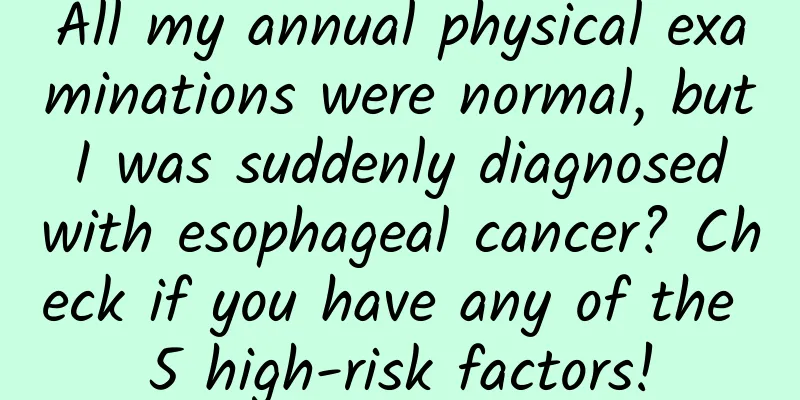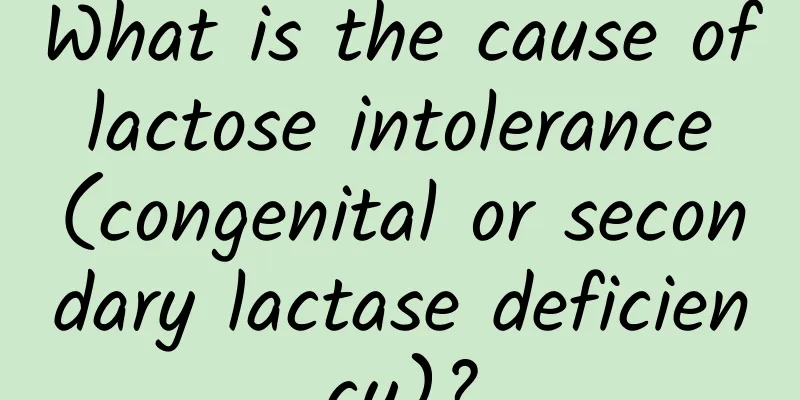All my annual physical examinations were normal, but I was suddenly diagnosed with esophageal cancer? Check if you have any of the 5 high-risk factors!

|
Recently, a piece of news about #Man who had normal physical examinations every year was suddenly diagnosed with esophageal cancer# has become a hot search. A man who had normal physical examinations every year was suddenly diagnosed with esophageal cancer, and it was already in the late stage. Mr. Qian was usually in good health, but he went to the doctor because he felt a foreign body sensation when swallowing, and unfortunately he was diagnosed with late-stage esophageal cancer. According to epidemiological data released by the National Health Commission, there were 224,000 new cases of esophageal cancer and 187,500 deaths in my country in 2022, accounting for 4.64% and 7.28% of all malignant tumors, respectively. The incidence and mortality rates of esophageal cancer were 15.87/100,000 and 13.28/100,000, respectively. August 24th of every year is the "Esophageal Cancer Patient Care Day". What exactly is esophageal cancer? How can we actively prevent and treat it? Let us follow the explanation of Professor Li Xu from the Department of Thoracic Surgery of Hunan Cancer Hospital to understand esophageal cancer, prevent and treat esophageal cancer, and jointly protect esophageal health. 1. What is esophageal cancer? Esophageal cancer refers to a malignant tumor originating from the esophageal epithelium, with the main symptoms being a choking sensation, a foreign body sensation, pain behind the sternum, or obvious dysphagia when swallowing food. If metastasis or tumor invasion occurs, hoarseness, body pain, and corresponding discomfort in the affected organs may also occur. The incidence of esophageal cancer in my country ranks about 6th among all malignant tumors, and the mortality rate ranks about 4th. The peak age of onset is 45-80 years old, and there are obvious regional differences in the incidence. 2. What are the causative factors of esophageal cancer? 1. Smoking and drinking Smoking and heavy drinking are important factors causing esophageal cancer. In clinical work, patients who smoke and drink for a long time account for the vast majority. 2. Nitrite Nitrosamine compounds are an important factor leading to esophageal cancer. Long-term consumption of pickled food is related to the incidence of esophageal cancer. 3. Mycotoxins Aflatoxin, Fusarium and other fungi in moldy food are related to the incidence of esophageal cancer. 4. Lack of trace elements and vitamins Long-term lack of trace elements in the diet, such as selenium and vitamins, is one of the causes of the disease and is considered to be one of the factors of regional incidence. 5. Other factors Obesity, reflux esophagitis, esophageal diverticulum, etc., may cause the esophagus to become cancerous under long-term inflammatory stimulation. 3. What are the symptoms of esophageal cancer? The clinical manifestations are significantly related to the early and late stages of the disease. Early esophageal cancer may have no obvious symptoms, or there may be discomfort such as choking after eating, food stagnation, belching, etc.; mid-stage esophageal cancer is mainly characterized by progressive dysphagia and pain behind the sternum; in the late stage, hoarseness, cough, vomiting blood, dyspnea, body pain and other symptoms of metastasis and organ invasion may occur. 4. Which group of people are most likely to get esophageal cancer? According to the guidelines of the National Health Commission, high-risk groups refer to those aged ≥45 years and who meet any of the following conditions: (1) Living in areas with a high incidence of esophageal cancer (defined as county-level administrative areas, with an age-standardized incidence rate > 15/100,000 based on the population structure of China in 2000). (2) There is a history of esophageal cancer among first-degree relatives such as parents, children, and siblings. (3) Bad eating habits and lifestyles, such as hot and spicy food, high-salt food, pickled food, smoking, and heavy drinking. (iv) Patients suffering from chronic esophagitis, Barrett's esophagus, esophageal diverticulum, achalasia, reflux esophagitis, benign esophageal stricture, etc. (V) The patient has a history of diagnosis and treatment of esophageal precancerous lesions. 5. What bad eating habits can easily lead to esophageal cancer? Long-term hot and spicy food, high-salt food, pickled food, smoking, heavy drinking and other bad eating habits and lifestyles can easily lead to esophageal cancer. Eliminating the above bad eating and lifestyles can effectively reduce the incidence rate. 6. What examinations can be used to detect esophageal cancer in advance? Esophageal endoscopy is the most important means of early detection of esophageal cancer. In principle, people at high risk of esophageal cancer should undergo an endoscopy every 5 years. It is recommended that the screening interval be shortened for those with the following lesions: ◆ Patients with low-grade intraepithelial neoplasia should undergo endoscopic examination every 1 to 3 years. ◆ Patients with low-grade intraepithelial neoplasia combined with endoscopic high-risk factors or lesions with a long diameter >1cm should undergo endoscopic examination once a year for 5 years. ◆ Patients with Barrett's esophagus and low-grade intraepithelial neoplasia should undergo endoscopic examination once every 6 to 12 months; patients with Barrett's esophagus without dysplasia should undergo endoscopic examination once every 3 to 5 years. Warm reminder: For the treatment of esophageal cancer, early detection, early diagnosis, and early treatment are advocated, which can achieve good long-term efficacy and even cure. Combining standardized traditional treatment methods such as surgery, chemotherapy, and radiotherapy, plus new treatment methods such as immunity and targeted therapy, the efficacy of mid- and late-stage esophageal cancer has also made great progress. Source: Hunan Cancer Hospital Follow @湖南医聊 to get more health science information! (Edited by YH) |
<<: #千万IP创科学普# Interesting words about medicine丨Thalidome (with audio)
>>: Lightning avoidance! Is it more effective for children to cry when they are nebulized?
Recommend
What is vulvar leukoplakia?
Because we know very little about some diseases i...
Can minimally invasive surgery completely remove the tumor?
On March 28, 2021, the 63rd patient education liv...
What kind of wine can easily make women drunk
For many female friends, they actually like to dr...
What happens if the bacterial vaginosis test is negative?
Vaginitis is a disease that women are very likely...
Why do men with impotence often fart? Clinical research gives the authoritative answer!
Recently, the COVID-19 epidemic has reached a cli...
Can I apply a plaster during my period?
Ointment treatment is a very popular way of treat...
How to lose belly fat during menstruation
During menstruation, the body's metabolism is...
Sixth day after medical abortion
Medical abortion has a great impact on the body. ...
The right side of the appendage is always aching
The main cause of the dull pain in the right adne...
What's wrong with the sudden extension of menstrual period?
In daily life, many female friends have their per...
If your child has a runny nose, you can identify rhinitis by the color of the snot!
Although it is the beginning of autumn, the weath...
Where does fallopian tube inflammation hurt?
For every disease that occurs, there is a corresp...
How long after abortion can you eat spicy food?
Abortion is a very common surgery. The scale of t...
What does calcification of breast hyperplasia mean?
The breast is the most important part of the fema...
What causes a shortened menstrual period?
There are always a few days of menstruation every...









